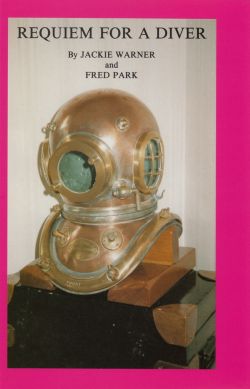Requiem for a Diver By Jackie Warner and Fred Park
₱2,800.00
- ISBN: 978-0-85174-578-7
- Published date: First published 1990
1 in stock
Jackie Warner was the Chief Inspector of Diving at the Department of Energy and Fred Park was a journalist on the staff of the Aberdeen Press and Journal, during the early days of exploration and exploitation of offshore oil and gas in the North Sea. On his retirement Jackie Warner decided to write a book about the North Sea bad old days, or klondike days, depending which side one was on and persuaded Fred Park to collaborate. It is the story of 15 years of diving fatalities, of getting from “no rules, no holds barred” to become a safe well regulated and professional industry.
The book is aimed at the International Oil Industry and in particular the Offshore Industry, Divers throughout the world and with an insight for the layman to look into the many interesting facets of that tough and dangerous business.
The foreword by Tony Benn sets the scene for the descriptions of the many battles that were fought in the process of establishing Diving Safety.
The author covers the problems faced by a Naval Officer in close contact with, what he called, “Paper Pushing Bureaucrats”. His attitude to Civil Servants, Trade Unions, Politics and Race tend to be reflected in some of the observations in the book and the reader is invited to apply their own ‘index error’ where appropriate. It is a story of American toolpushers in stetsons and high-heeled boots (shit kickers) who were a law unto themselves. It is a story of 54 deaths, many in bizarre circumstances which will never be explained. Above all it is a story of change, from the ‘Wild West’ days of the cowboys, the frontier days of the so called pioneers to today. It covers the problems and dangers that all offshore workers have to face, to which the divers have to add their own particular hazards and it introduces touches of ‘Diver Humour’.
The exploration for North Sea oil and gas started in the early 1960s, and it is true to say that it was essentially an extension of activities in the Gulf of Mexico. However the North Sea was a whole new ball game as far as competing with the elements was concerned. It was rough, cold, deep and had little or no weather warning system. Divers were required at all stages of the operations and the world was short of experienced offshore divers. In fact the world was rapidly running out of that commodity. This situation led to a bonanza for some for the wages were high but early death or permanent disability for many. ‘Cowboys’ with no diving training or experience queued up to get jobs as divers and it was not surprising that the accident rate became the highest in any industry in Europe. Wherever there is a situation that provides a lot of money there will be bums and hangers on and the North Sea during this period was no exception.
The list of fatalities is the most comprehensive and detailed that has ever been published on the recorded incidents in Northern Europe.
Given the horrifying statistics that showed a one in ten chance of death, the hostile environment and the extreme cold which were part of a diver’s day, one has to wonder what kind of men would take such risks, accept such discomfort … and why? Legislators throughout the world have tried to define, in legal jargon, “a diver”, and all have failed to get the definition accurate because diving is a complex profession, a multi-discipline discipline, which encompasses medicine, physiology, human ‘engineering, mechanical, electrical and pressure engineering, seamanship and a large measure of common sense. Divers come from all walks of life from every nation and they are all individuals. They have to be
No document that looks at fifteen years of offshore diving, 54 deaths and a decade and a half of progress towards near-zero fatalities would be complete without reference to diving doctors, the medical men who were involved, at varying levels, in diving. They are a complete enigma. The author acknowledges their dedication and their help in making diving safer but “on occasions they fight like cat and dog amongst themselves” and “some are greedy for power or status, and some are over interested in money”.
Even before the accident investigations showed that lack of proper training was a big factor in the very high accident rate it was realised that action was necessary to establish diving training standards. The problems involved in such a task were immense and not always helped by civil service bureaucrats and their inability to make decisions.
As with any book that primarily deals with diving matters Commander Crabb is mentioned but with a new approach and who more qualified, as Crabbie was godparent to Jackie Warner’s daughter.
Be the first to review “Requiem for a Diver By Jackie Warner and Fred Park” Cancel reply
Related products
Brown, Son & Ferguson
Astronomy Simply Explained for Beginners By F.W. Murray First published 1912-7th edition 1985
Brown, Son & Ferguson
Browns Knots and Splices By Capt S. Jutsum First published 1912-3rd edition 1983












Reviews
There are no reviews yet.